"Cairo, the dreaming city that never sleeps. Even late at night, its streets are bustling with people, cafes and restaurants would still be open, and music would be playing from every corner," wrote Hans Eppendorfer in his book, “Cairo, the Dreaming City That Never Sleeps.”
This city, which has expanded into three major governorates (Cairo, Giza, and Qalyubia), collectively known as Greater Cairo, now faces a decision that threatens its vibrant urban life. In the midst of an ongoing fuel and natural gas crisis in Egypt, the government has implemented measures to conserve electricity, including enforcing strict opening and closing hours for shops and cafes across various governorates. The authorities have shown strict monitoring to ensure the implementation of these measures and compliance with the stipulated times.
As of July 1, 2024, shops are required to close at 10 PM, a measure that will remain in effect until September 26, 2024, according to the Egyptian government. Exceptions are made for pharmacies, supermarkets, and restaurants, which are allowed to stay open until 1 AM. On Thursdays, Fridays, and public holidays, closing times are extended to 11 PM. This is a stark change from the previous norm, where many establishments remained operating around the clock.
The new regulations have led many Egyptians to reminisce about past curfews imposed during the January 25 Revolution in 2011 and the COVID-19 pandemic in 2020 when Cairo bid farewell to its lively nights and shopping, music, and cruising through its old streets long hours into the night.
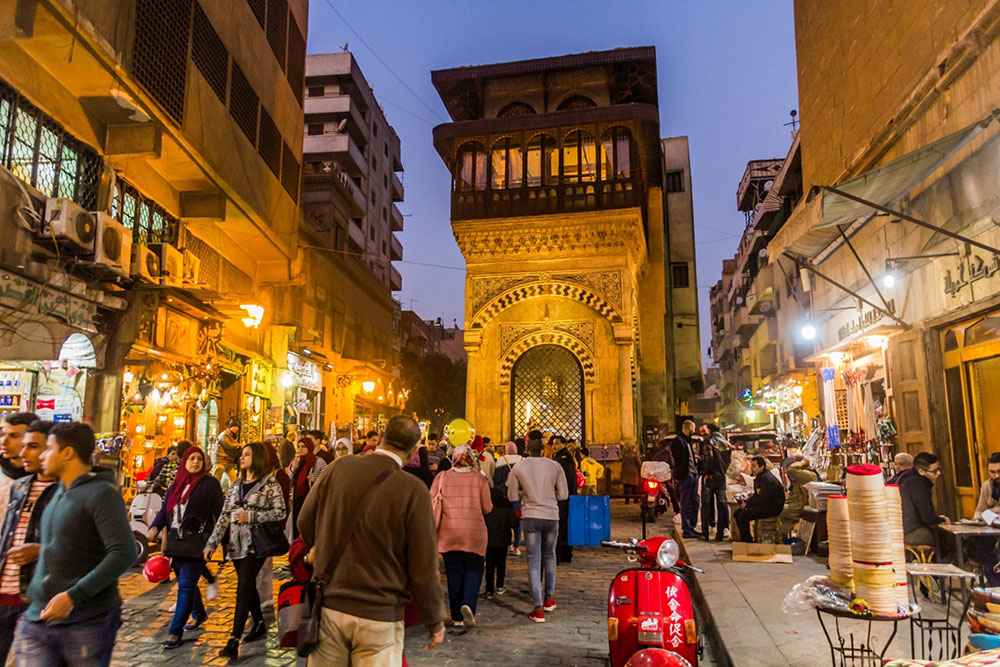 Evening at Al-Mu’izz Street in the bustling historic center of Cairo, Egypt – January 2019
Evening at Al-Mu’izz Street in the bustling historic center of Cairo, Egypt – January 2019
Evening at Al-Mu’izz Street in the bustling historic center of Cairo, Egypt – January 2019
In the early days of the decision to close shops early, many Egyptians expressed concern about the future of Cairo, fearing that it had lost a part of its vibrant charm. Many wondered: Will this decision bring about social and economic changes that will alter the lifestyle of Cairo's residents and visitors?
Cairo losing its charm
In the early days of the decision to close shops early, many Egyptians expressed concern about the future of Cairo, fearing that it had lost a part of its vibrant charm. Many wondered: Will this decision bring about social and economic changes that will alter the lifestyle of Cairo's residents and visitors?
Dr. Said Sadek, a sociology professor at the American University of Cairo (AUC), noted that the early closure of shops will undoubtedly impact the daily lives of residents. He explained that life in Cairo typically begins at night, especially during the warmer months. "We are in the summer, and people seek relief outside their homes at night. Now, with power outages and early closures, we are closing off all options for people," he stated.
Speaking to Raseef22, Sadek predicted an increase in crime and harassment due to many private sector employees returning home late at night on dimly lit streets as a result of the electricity conservation measures and early shop closures. He suggested that such poorly lit and nearly empty streets would be more conducive to criminal activities. Dr. Sadek also pointed out that the most significant economic impact would likely impact vulnerable social groups the most, as reduced working hours could lead to job cuts or salary reductions, affecting the lives and habits of these families.
Economic expert Dr. Medhat Nafea acknowledged that, fundamentally, early closures could benefit the economy, especially given Egypt's current energy resource shortages and economic crisis, which he described as severe. However, he also noted that the timing of the closures was inappropriate.
Dr. Nafea tells Raseef22, "The problem lies in the shortened daylight hours in the summer, after local time was adjusted for daylight saving time. Then the early closure decision exacerbated the issue, making the day even shorter. The consequences of this decision will negatively affect commercial and tourist activities, especially in areas that depend on night shopping and cruising."
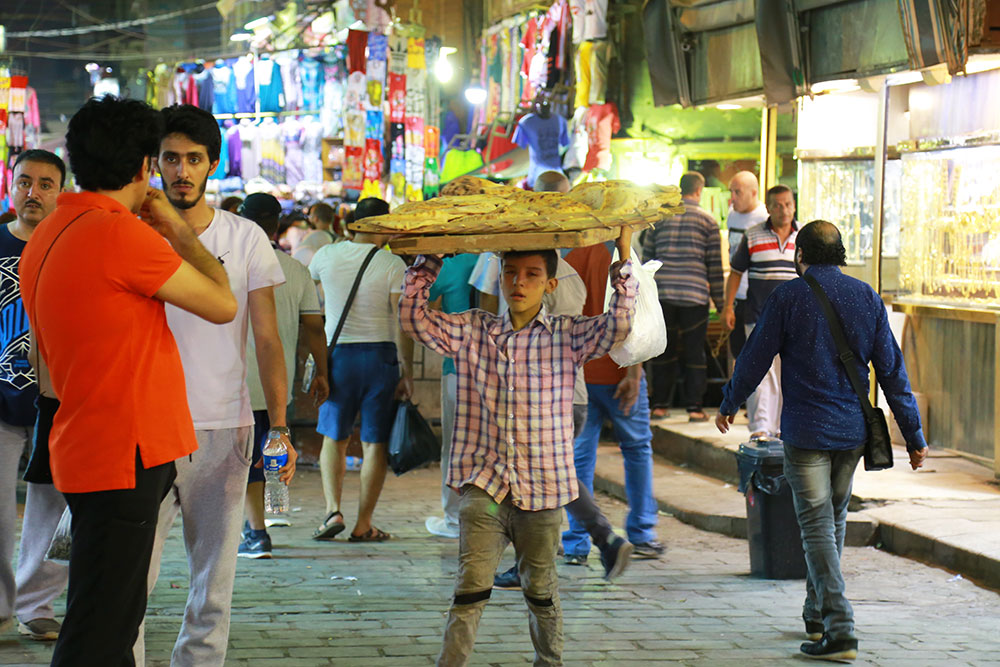 A boy selling bread at a famous market in Cairo — August 2018
A boy selling bread at a famous market in Cairo — August 2018
A boy selling bread at a famous market in Cairo — August 2018
Parliamentary division over the early closure decision
The image of Cairo, as perceived by both Egyptians and foreign tourists, is gradually fading due to government decisions aimed at conserving energy.
According to MP Amr Darwish, secretary of the Local Administration Committee in the House of Representatives, a committee partly responsible for setting shop opening and closing hours, this image and the general Egyptian culture of staying out late, needed to change.
In a televised statement, Darwish said that the decision should be implemented permanently, asserting that Cairo's philosophy of being a city full of life 24/7, and its label as "the city that never sleeps," must end. He mentioned that solutions should be found for those who may be adversely affected by the early closures.
However, not all representatives agree with Darwish. Alexandria MP Muhammad Jibril submitted an inquiry to Prime Minister Mostafa Madbouly, urging a reconsideration of the shops’ closing times. Jibril warned of the decision's negative repercussions, predicting increased unemployment as shop owners might lay off half their workforce. He also highlighted the potential negative impact on foreign tourism in Egypt.
Halted shopping and threatened sales
The streets of old Cairo, particularly in the Sayeda Zainab area, which were always bustling with visitors and worshippers, have become deserted, especially since evening prayers end just minutes before the mandatory closing time imposed at the end of June. People now rush to buy, sell, and close up shop before the police patrol passes by. Violating the order results in a warning for the shop owner and a forced closure, significantly affecting all activities related to shopping and leisure.
Aya Mahmoud, an employee at a development organization in her mid-40s, spoke to Raseef22 about her dissatisfaction with the early shop closures. She felt it was unfair to citizens as it reduced the time for leisure activities, outings, and shopping, and also unfair to sellers who rely on the best hours for sales, which usually begin after sunset. Mahmoud recounted an instance where she was caught off guard by the early closures while shopping, leaving her unable to buy the clothes she had picked, which forced her to take another day off work to find the right clothes for her child.
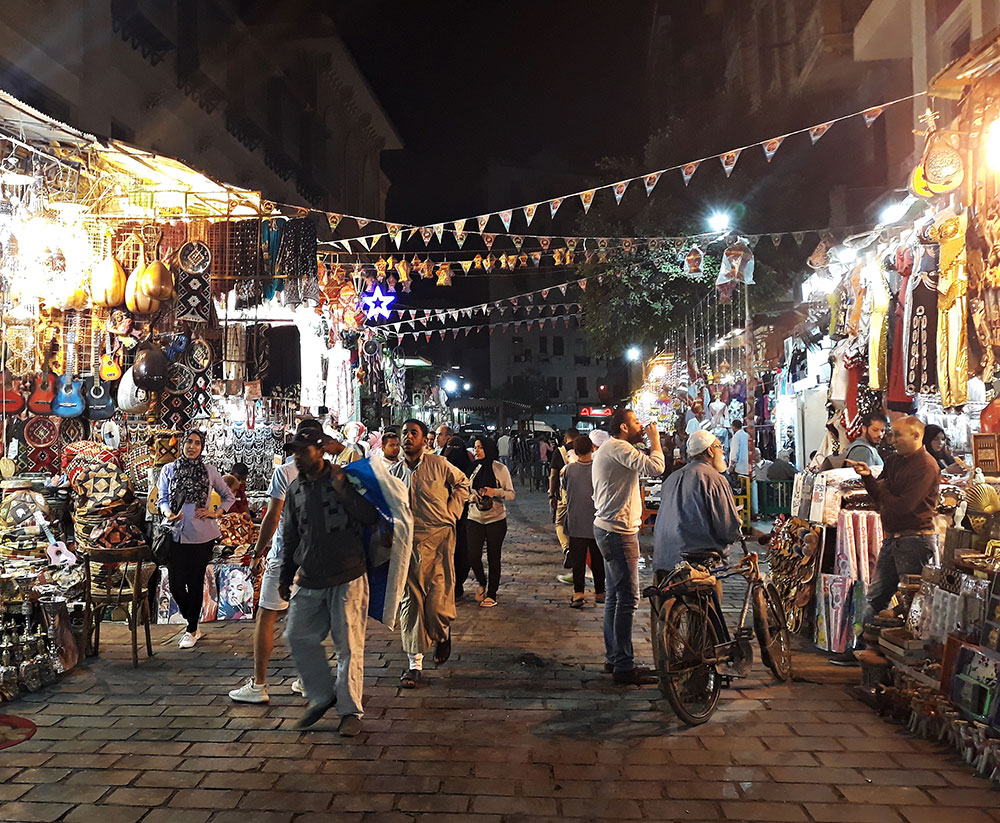 A street in Khan El-Khalili Souk in Cairo — May 2019
A street in Khan El-Khalili Souk in Cairo — May 2019
A street in Khan El-Khalili Souk in Cairo — May 2019
An increase in crime, harassment, unemployment, a negative impact on tourism, and the encouragement of informal commercial activities are all fears of grim social and economic consequences regarding the government’s recent early shop closure policy. These concerns come amid calls to avoid blindly imitating foreign policies without considering Egypt's unique social context and climate.
Mohammad Abdel Maqsoud, 38, who has been working in clothes manufacturing for 12 years, shared similar concerns. He noted that the current crises—both power outages and early shop closures—had significantly impacted his sector. “Factories have suffered, with production time reduced by two hours due to power cuts, leading some factory owners to deduct an hour's pay from workers' daily wages.”
Speaking to Raseef22, Mohammad highlighted the severe impact on clothing sales, “The decision has affected the sale of clothes, with an approximately 75% drop in business for one of the shops I supply, where daily sales plummeted from 10,000 Egyptian pounds (approximately $205) to just 2,500 pounds (approximately $51). This decline affected my supply business since the clothing market relies heavily on post-8 PM activities and shopping, and now shops open earlier at 10 AM, to little effect.”
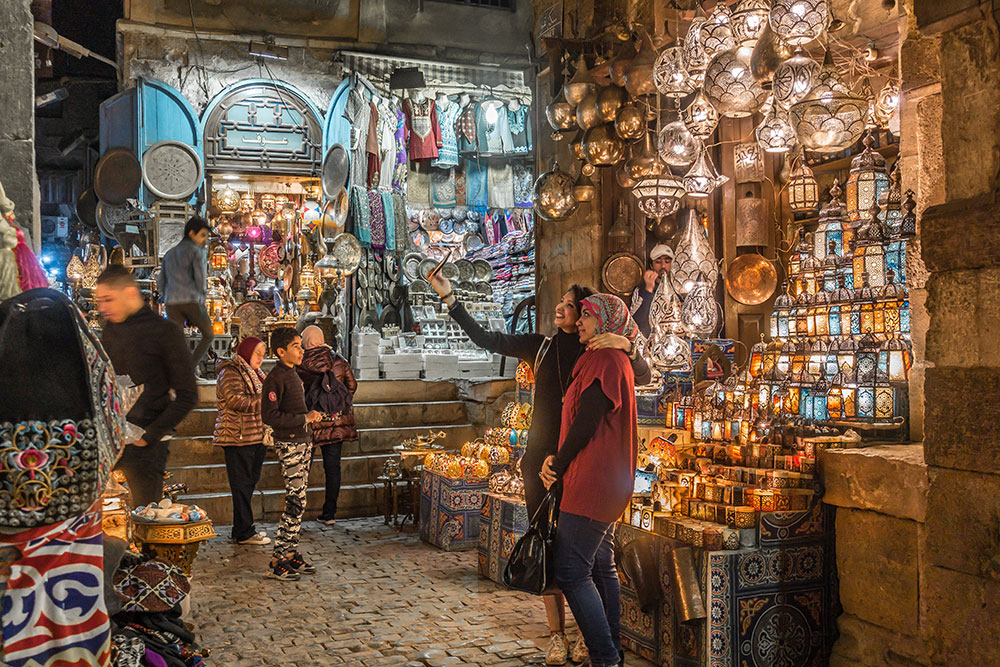 Lantern shop at Khan El-Khalili market, Old Cairo – February 2019
Lantern shop at Khan El-Khalili market, Old Cairo – February 2019
Lantern shop at Khan El-Khalili market, Old Cairo – February 2019
A threat to the tourism sector
The tourism season in Egypt has faced numerous crises in recent years, including the Russian plane bombing, the COVID-19 pandemic, the Russia-Ukraine war, and now the ongoing war on Gaza.
Tour guide Ahmed Marzouk tells Raseef22 that tourists expect Cairo to be vibrant around the clock. He warned that the early closure policy could negatively impact tourism and, consequently, the national economy, with its effects becoming more apparent over time.
Marzouk explains, "Tourists won't go out at night if most areas in downtown or historical sites like Al-Mu’izz Street and the souk of Khan el-Khalili are lifeless and dark." He added, "Enjoying the sights of the city at night, an activity we call ‘Cairo By Night’, is a key attraction for tourists, especially those coming from countries with early closure laws, who come to Egypt to experience its lively atmosphere throughout the day and night."
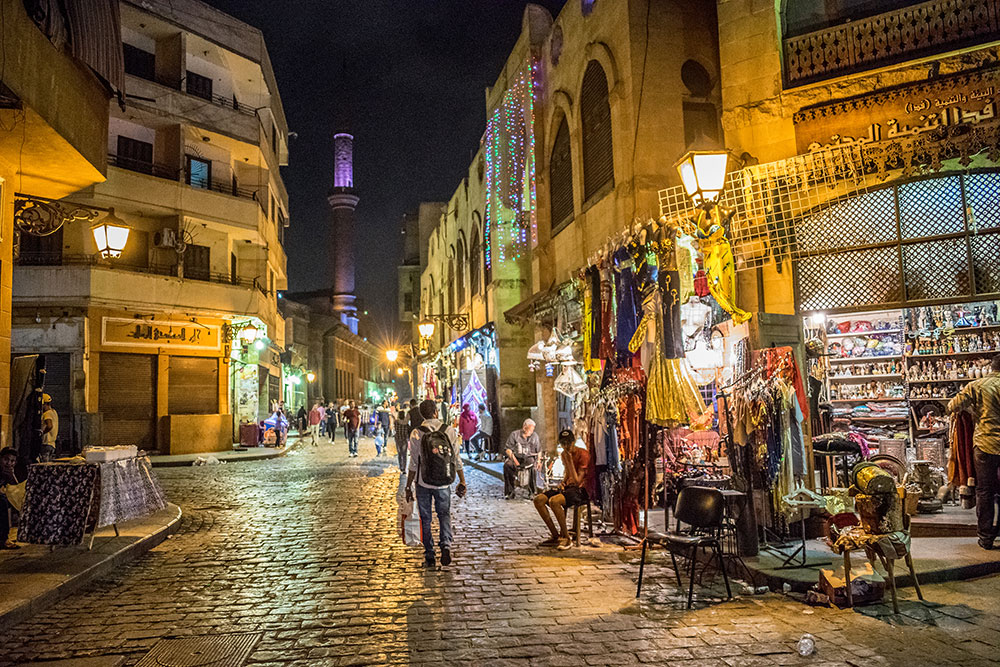 Tourists walking down Al-Mu’izz street market, Old Cairo– May 2018
Tourists walking down Al-Mu’izz street market, Old Cairo– May 2018
Tourists walking down Al-Mu’izz street market, Old Cairo– May 2018
Tour guide Nasser al-Nouby emphasizes that Cairo, as Egypt's capital, should not be dark or empty, especially in the summer given its hot climate. Tourists save money to enjoy attractions and cafes, only to find the city center dimly lit. He tells Raseef22, "The city looks aged; this does not resemble Cairo. During the day, tourists are busy visiting historical and archeological sites, and in the evening, they want to enjoy the vibrant life in the city center and its cultural sites.”
Unlike other governorates, Cairo is known for its 24-hour cafes, a feature the city is now losing. Ahmed el-Guhainy, a café owner in his 50s in the Abdin district near downtown, expressed surprise at the strict enforcement of the new closing times by local authorities and the police and their severe treatment of those who do not comply.
El-Guhainy explained, "Cairo is different from other governorates. Here, night activities start around ten o'clock, unlike in rural or Upper Egyptian governorates where cafes might close after evening prayers due to the lifestyle there." He added, "My café never used to close, and business peaked after evening prayers. The early closure has led to a significant loss of customers."
The impact extends to café employees, with el-Guhainy noting a reduction in their daily wages due to decreased earnings, as well as a decline in tips.
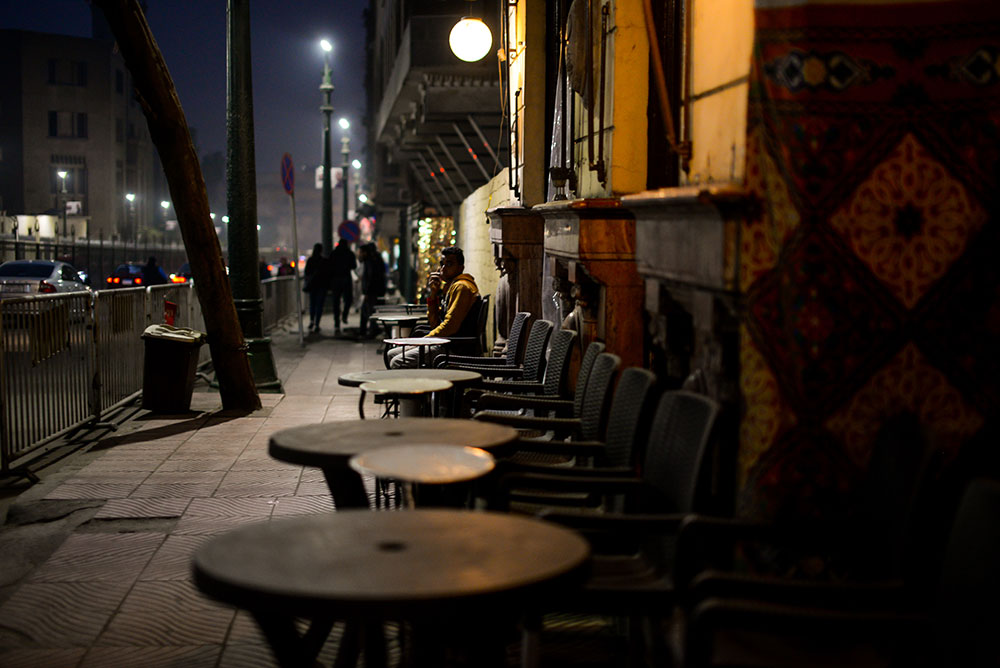 Empty coffee tables at night in the dark streets of Cairo
Empty coffee tables at night in the dark streets of Cairo
Empty coffee tables at night in the dark streets of Cairo
Sociology professor Said Sadek argues that it is unreasonable to burden citizens with the consequences of poor decision-making by officials, predicting that this could increase public discontent with the government
Ignoring public opinion
Earlier, the government reinstated daylight saving time, claiming it reduces energy consumption, although sources in the Ministry of Electricity noted it did not significantly lower usage as expected.
Economist Dr. Hamdi el-Hinnawi criticized the unilateral decision to implement early shop closures without public consultation or holding a community dialogue, particularly as it does not align with the lifestyle in Egypt's hot climate. He explained to Raseef22, "We shouldn't blindly mimic foreign countries' closing times without considering social customs and lifestyle differences. For example, in England, shops close at five in the evening due to various factors, including stable conditions and colder weather."
El-Hinnawi believes that any decisions, particularly those affecting public affairs, such as closing shops to save energy or any other measure, will only be effective if the views of experts are considered—a step that hasn't been taken. He argues that closures shouldn't be imposed from a single perspective, lamenting the lack of strong political parties or unions to advocate for the national economy and workers' rights, noting that if such bodies existed, issues like worker protection and work hours could be better negotiated.
An unresolved debate on the decision's effectiveness
Economic expert Dr. Medhat Nafea does not encourage leaving the closing times to the discretion of shop owners, nor does he support citizens staying late at cafes, as he sees this as a consumption-driven activity that negatively impacts the economy. He suggests the government set the closing time at midnight instead of 10 PM, offering a flexible compromise between business owners and the government, with exceptions for tourist and historical areas.
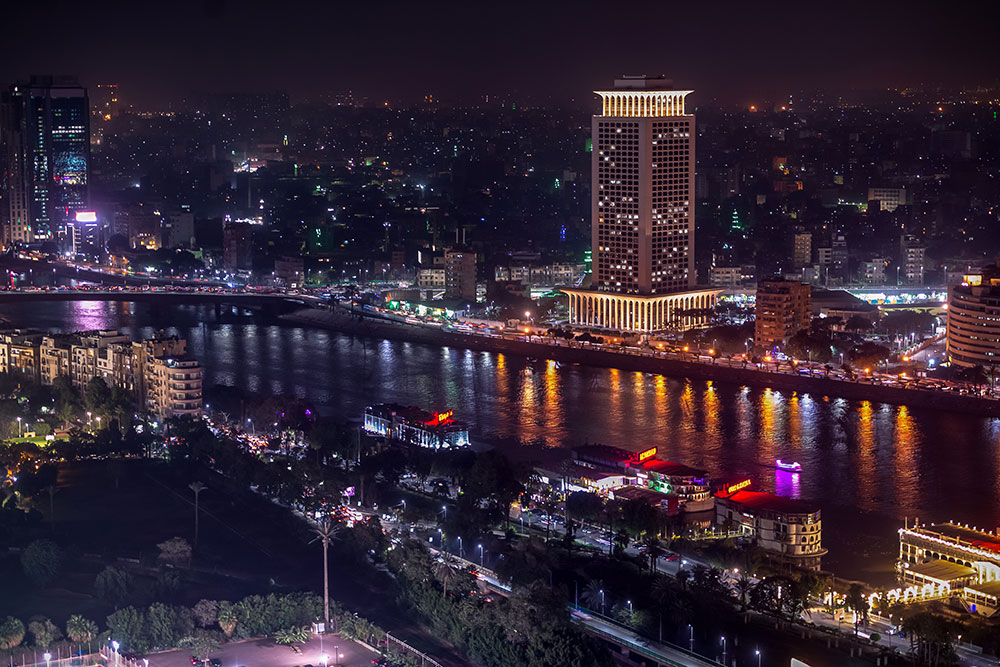 Night view of the city of Cairo — November 2018
Night view of the city of Cairo — November 2018
Night view of the city of Cairo — November 2018
"Governments since the 1952 Revolution have not cared about human or workers’ rights," emphasizes an Egyptian sociology professor, noting that the current closures are not comparable to the lockdown imposed during the COVID-19 pandemic in 2020, as the pandemic was an exceptional situation that the public understood, whereas the current situation stems from mismanagement by officials.
Nafea doubts that the decision will lead to higher unemployment rates, suggesting that citizens will adapt if the government maintains the policy, especially if there is demand for goods outside of the restricted hours. He also anticipates that the decision may be reversed in the near future due to the nature of Egypt's economic activities during the summer.
However, sociology professor Said Sadek argues that it is unreasonable to burden citizens with the consequences of poor decision-making by officials, predicting that this could increase public discontent with the government. He says, "Governments since the 1952 Revolution have not cared about human or workers’ rights.”
He asserts that the current closures are not comparable to the lockdown imposed during the COVID-19 pandemic in 2020, as the pandemic was an exceptional situation that the public understood, whereas the current situation stems from mismanagement by officials.
The online account AlMawkef AlMasry (‘Egyptian Stance’) pointed out that the decision comes in exceptional circumstances where large social segments are suffering from severe economic crises, leading to a decline in purchasing power. The account warned that the decision could encourage informal economic and commercial activities (which consume energy categorized under residential use) at the expense of formal ones. It is noted that according to the Egyptian Electricity Holding Company, these commercial activities, which could be subject to the decision, consume only 6% of Egypt's total electricity consumption, less than the consumption of public facilities and government buildings, which accounts for around 13%.
Raseef22 is a not for profit entity. Our focus is on quality journalism. Every contribution to the NasRaseef membership goes directly towards journalism production. We stand independent, not accepting corporate sponsorships, sponsored content or political funding.
Support our mission to keep Raseef22 available to all readers by clicking here!
Interested in writing with us? Check our pitch process here!





